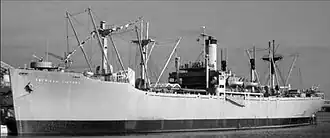Marine Transport Line
| Founded | 1942 |
|---|---|
| Successor | Marine Transport Corporation and Crowley Maritime |
| Headquarters | New York, New York, North Charleston, South Carolina |
Area served | Cargo Worldwide |
| Parent | C.D. Mallory & Company |
Marine Transport Line (MTL) of New York, New York was a commercial steamship service started to support the needs of support charter shipping for the Maritime Commission and War Shipping Administration during World War 2 by CD Mallory & Co..[1] During wartime the Marine Transport Line operated Victory ships, and also a few other ships.
After the war it moved to operating mostly tanker ships. [1][2][3][4][5] MTL was acquired by the General American Transportation Company in 1970, which spun it off in 1983.[6] In 1998, it became part of the Marine Transport Corporation, which was acquired by Crowley Maritime in 2001.
MTL experienced major incidents with its converted tanker fleet, including the 1963 disappearance of the SS Marine Sulphur Queen and the 1983 sinking of the SS Marine Electric, both converted World War 2 tanker ships. [7][8][9][10]
World War II

Operated during World War II:
- SS E. Kirby Smith
- SS Harvey Cushing
- SS Adelphi Victory[11]
- SS Alcedo (freighter sank, torpedoed February 28, 1945)[12]
- SS Battle Creek Victory
- SS Black River (tanker)
- SS Chapel Hill Victory
- MV Halma (sank hit mine 1942)
- SS Howell E. Jackson
- SS Malchace[13]
- SS Medina Victory
- SS Panama Victory
- MV Sheherazade (attacked and sank 1942)
- SS Trinidad Victory
- SS Trinity Victory
- SS Wheaton Victory
- SS Winthrop Victory
Korean War
- 16 tankers [14]
- USNS Paoli (T-AO-157)
Post War
- Kentucky
- Marine Union
- SS Marine Merchant, a converted Liberty ship (split in half on the night of April 13–14, 1961) [15]
- SS Marine Sulphur Queen, ex Esso New Haven, a converted T2 tanker (disappeared with all hands on or about 4 February 1963)
- SS Marine Floridian, ex USNS Paoli (above), a converted T2 tanker; collided with the Benjamin Harrison Bridge on 24 February 1977 (scrapped in 1997)
- SS Marine Electric, ex Musgrove Mills, Gulfmills, a converted T2 tanker purchased by MTL in 1961 (Foundered on 12 February 1983)
- Nagano, Bulk carrier 1963
- Oswego Courage (1973)
References
- ^ a b "House Flags of U.S. Shipping Companies: M". www.crwflags.com.
- ^ Flags, Funnels and Hull Colours, by Colin Stewart, 1953
- ^ Flags, Funnels and Hull Colours, by Colin Stewart, 1953
- ^ U.S. Department of the Navy, Office of the Chief of Naval Operations, Directorate of Naval Communications (1952). U.S. Naval Flags and Pennants: Description, Uses and Customs DNC 27, Edition. Washington: U S. Government Printing Office.
{{cite book}}: CS1 maint: multiple names: authors list (link) - ^ "MARINE TRANSPORT LINES, INC., North Charleston, South Carolina, SC 29405-2424". www.southcarolinabids.us.
- ^ ""Pacific-class"". GlobalSecurity.org.
- ^ Zilnicki, Corinne (2019-02-11). "Marine Electric: The Wreck that Changed the Coast Guard Forever". maritime-executive.com. Retrieved 19 June 2019.
- ^ A firsthand account of the wreck by Bob Cusick, one of the surviving crew members
- ^ Archive of T2 Tankers
- ^ Distress radio traffic, 500 kHz from SS Marine Electric, call sign WOOH, SOS as recorded at USCG COMMSTA BOSTON / NMF on February 12, 1983.
- ^ "vicshipsA". www.mariners-l.co.uk.
- ^ "Panamanian and Hunduras ships". www.armed-guard.com.
- ^ "Malchace". uboat.net. Retrieved 23 February 2022.
- ^ Seafairs Log, June 26, 1953, page 6
- ^ Frump, Robert (30 September 2010). Until The Sea Shall Free Them. London. p. 196. ISBN 978-1-4070-9051-1. OCLC 1004570673.
{{cite book}}: CS1 maint: location missing publisher (link)